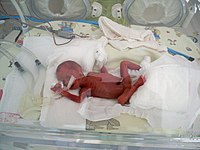
Photo from wikipedia
BACKGROUND For infants born in the contemporary era of neonatal care, little is known about adult mental health outcomes of extremely preterm birth (EP; Click to show full abstract
BACKGROUND For infants born in the contemporary era of neonatal care, little is known about adult mental health outcomes of extremely preterm birth (EP; <28 weeks' gestation) or extremely low birthweight (ELBW; <1000 g). This study aimed to compare attention deficit hyperactivity disorder (ADHD), anxiety, mood, and substance use disorder prevalence in young adults born EP/ELBW and normal birthweight (NBW; >2499 g) controls, and to compare change in prevalence of mental health symptoms and disorders from 18 to 25 years. METHODS Participants were a prospective geographical cohort of 297 consecutive survivors born EP/ELBW during 1991-1992 and 260 NBW controls. At age 25 years, 174 EP/ELBW and 139 NBW participants completed the Adult ADHD Rating Scale, Structured Clinical Interview for DSM-IV Disorders, Beck Anxiety Inventory, and Center for Epidemiologic Studies Depression Scale-Revised. Data from follow-up at 18 years were also utilized. Multiple imputation was used to account for attrition. RESULTS Mental health outcomes at 25 years were similar between groups: prevalence rates were ADHD 7% v. 5%; anxiety 32% v. 27%; mood 38% v. 35%; substance use 12% v. 14% in the EP/ELBW and NBW groups, respectively. In both groups, ADHD declined between 18 and 25 years [odds ratio (OR) per year = 0.87, 95% confidence interval (CI) 0.79-0.95], and generalized anxiety disorder and major depressive episode became more common (OR 1.22, 95% CI 1.10-1.35 per year; OR 1.20, 95% CI 1.10-1.30 respectively). CONCLUSIONS This contemporary EP/ELBW cohort has comparable young adult mental health outcomes to controls, and similar patterns of change in mental health from late adolescence.
Journal Title: Psychological medicine
Year Published: 2022
Link to full text (if available)
Share on Social Media: Sign Up to like & get
recommendations!